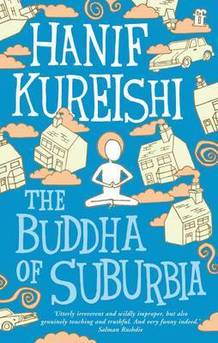 The Buddha of Suburbia was going to be called The Streets of My Heart, a title which emphasizes the fact that the novel is, on one level, a sentimental education as Karim struggles to ‘learn what the heart is’. The first title also suggests that this is an urban novel in which the streets, instead of being a place of danger as so often in London literature, are the locus of erotic possibility.
The Buddha of Suburbia was going to be called The Streets of My Heart, a title which emphasizes the fact that the novel is, on one level, a sentimental education as Karim struggles to ‘learn what the heart is’. The first title also suggests that this is an urban novel in which the streets, instead of being a place of danger as so often in London literature, are the locus of erotic possibility.In some ways, The Streets of My Heart might seem to reflect the contents of the novel more accurately. After all, only the first part of the novel is actually set in the suburbs; and Karim’s father, the eponymous Buddha, fades from view for much of the second part. Despite this, the title The Buddha of Suburbia is not only more catchy and original but also emphasizes the heterogeneity of the novel’s suburbs, which are not all steely conformity and twitching net curtains. ‘Was I conceived like this,’ Karim wonders, ‘in the suburban night air, to the wailing of Christian curses from the mouth of a renegade Muslim masquerading as a Buddhist?’ .
In 1990 there were hardly any English novels about growing up as a mixed race child so The Buddha of Suburbia and Kureishi’s first film with Stephen Frears, My Beautiful Laundrette,
were important interventions in the debate about what it means to be
British in the wake of postwar immigration. A lot of critical attention
has quite rightly been paid to this. Now, in large part because of
Kureishi’s work, multiculturalism is mainstream. So this is a
particularly a good moment to look back at less discussed but equally
significant aspect of The Buddha of Suburbia: its treatment of class and the links between class and place.
If
namedropping were a crime, Kureishi would be on death row. The pages of
his first novel are peppered with references to pop culture and the
literary canon, sometimes up to five, ten times per page. Being his
first novel, it seems like he has something to prove, how well read and
studied he is. I remember reading an Umberto Eco essay where he talks
about the open/closed text, and how the post-modern
writer/author/narrator/whatever will write using genre, vernacular,
whatever, to appeal to a wide (dumb) audience, whilst still putting in
little "winks" for the educated reader, who can pick up on that shit (he
gives Dante as an early example, I don't remember who for a
contemporary example but probably considers his own work in that light).
Kureshi does not do this. Subtlety is unheard of in his world,
and for all we know, he's just read a couple of wikipedia pages,
because it's all 'my copies of On the Road and Tropic of Capricorn this
and 'he had a moustache like Flaubert' this, and 'they were talking
about obscure composers like Dvorak' that.
It's little more than
embarrassing. As for the narrative itself, it's told from the point of
view of a 20 year old Indian boy living in the United Kingdom, (fuck
knows if this is disguised autobiography, I can't be bothered looking
into the background), and appears to want to reflect the 'On the Road's
and 'Tropic of Capricorn's, the world of entry level lit for young horny
dudes with existential issues, but it's carried with an ungrounded
pretentiousness that I usually let Henry Miller get away with; but at
least unlike Kerouac, Kureishi knows how to write. It's entertaining
enough that I read the bulk of it without stopping on the 3 hour all
stops Sydney-Newcastle train between 11pm-2am, feeling slightly hazy all
the time. My last gripe with the book is that it is not funny, but the
whole thing is screaming out "Look at me, I'm quirky, I'm funny", but I
not once even smiled when reading this. The attempts at jokes just
shitted me. I guess it is his first novel though. I hope they get better.


No comments:
Post a Comment